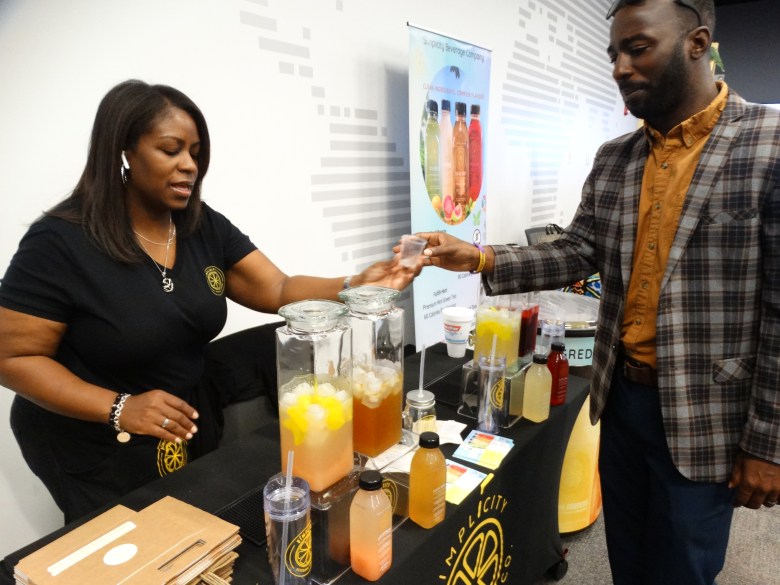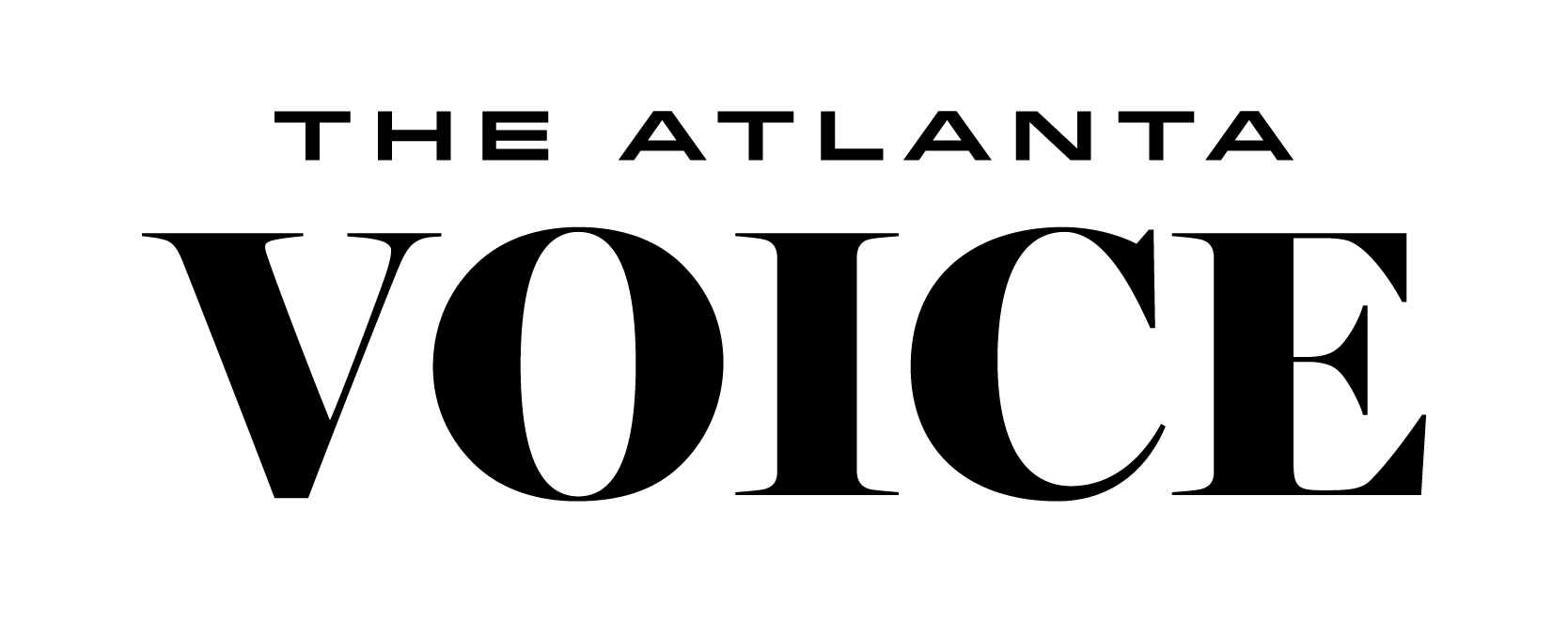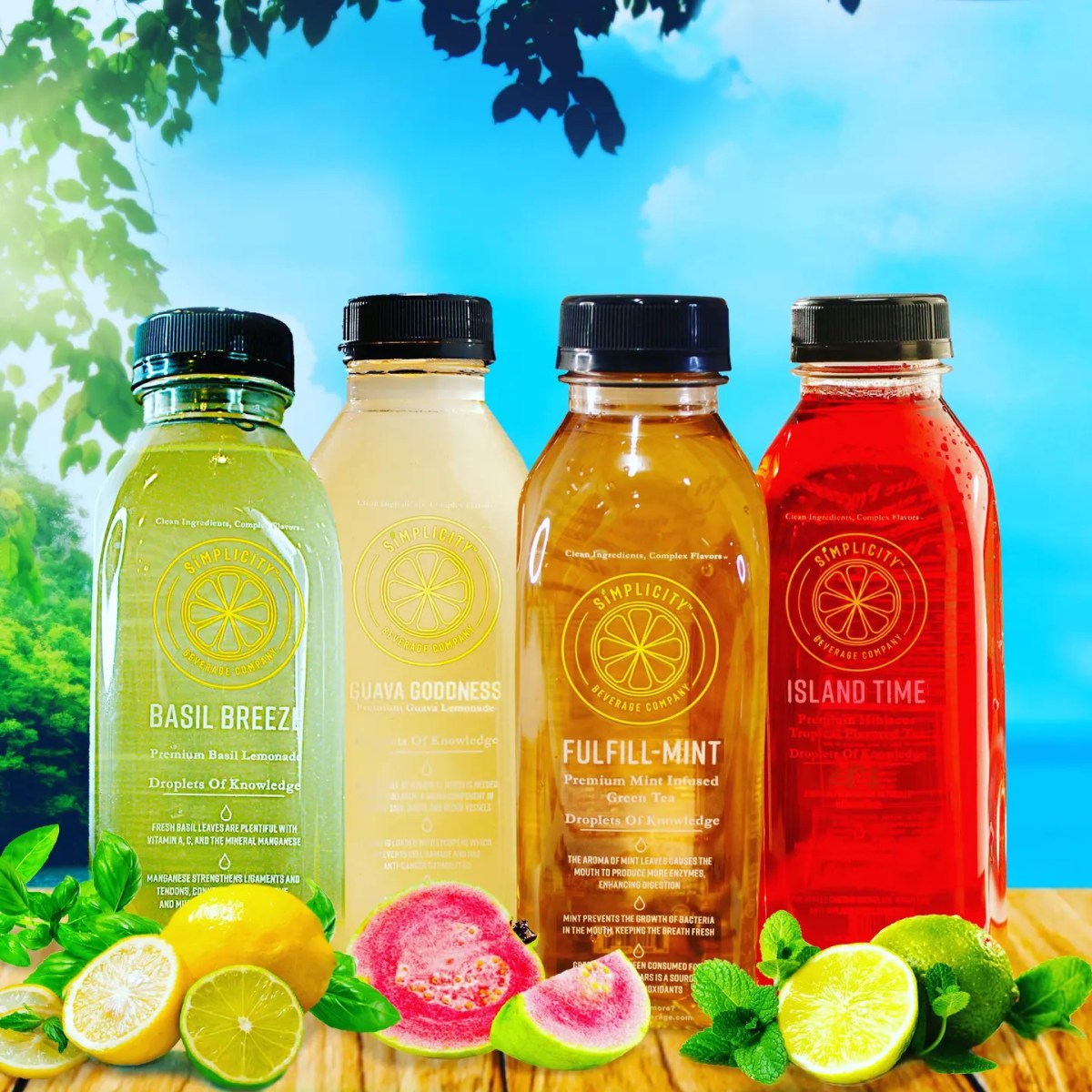The beverages produced by the Simplicity Beverage Company of Atlanta may be the only teas and lemonade that are officially approved by a medical doctor.
That stamp of approval comes from Dr. Bianca Kiovanni, the creator and owner of Simplicity Beverage Company. Kiovanni is a stakeholder in the Russell Innovation Center for Entrepreneurs (R.I.C.E), an institution designed to aid entrepreneurs.
Obviously, Dr. Kiovanni loves a challenge because she chose one of the most highly competitive industries in the U.S. – the beverage industry to launch her new business.
According to industry statistics compiled by Zippia, the non-alcoholic beverage industry is valued at an astounding $760 billion. In 2022, revenue from non-alcoholic beverage sales was around $447 billion.
The company sitting at the top of the non-alcoholic beverage mountain for more than a century is – you guessed it – Atlanta’s own The Coca-Cola Company with 42 percent of the market.

In breaking down the top five beverages sold in the U.S. Teas come in at number five with seven percent of the market, preceded by milk (7%), soft drinks (10%), coffee (14%) and the beverage we all don’t drink enough of – water (bottled and unbottled) at the top.
Dr. Kiovanni’s first line-up of “healthy” teas and lemonades (more flavors are planned to be released later this year) are not the traditional flavors you will find on your supermarket shelves. Her “complex” flavors are: Fulfill-Mint, a blend of green tea, mint and honey; Guava Goodness, a blend of guava and lemonade; Basil Breeze, a combination of lemon and basil; and Island Time, a fusion of pineapple, lime, lemon and a secret spice.
The recipes for the teas and lemonades went through several variations and were tested repeatedly, Dr. Kiovanni said of the beverages which have no artificial flavors or preservatives.
The beverages are in limited retail distribution but can be ordered from the website at: www.simplicitybeverage.com.
The following is an edited version of the interview for space purposes.
Atlanta Voice: You know you pick one of the most competitive industries to start a business in. Did you think about any other industry dealing with the health industry in order to go into instead of the beverage or you were locked in on the beverage and you knew that’s what you wanted to do?
Dr. Bianca Kiovanni: I was locked in on the beverage and knew what I needed to do. You know everything if you think these days, everything is super competitive. What doctor (with 20 years of experience) do you know is out here making drinks? What company do you know that’s actually genuine and honest about creating a product that’s actually decent for people? It’s a lot of competitiveness. But when you look at who’s adding chemicals, who’s cutting corners, who’s lying on their labels, I really don’t have that much competition. And I’ll tell you what, somebody may have tons of decades of experience in sales and marketing. But I know for a fact nobody has the credentials I have.
AV: From the time you settled on the idea to start a beverage company to actually starting it, how long was that?
BK: More than 10 years.
AV: Was it a start and stop process?
BK: It was a start and stop process, because I was building my practice at the same time. So I would dabble in it. You know, I wrote the recipes for S\implicity. It’s been more than a decade ago. I would write the recipes. And then I would tinker with them. And I don’t like this and I don’t like that. But I had to teach myself how to write a recipe. How do you scale a recipe? Because making a pitcher of something at the house is totally different than the hundreds of gallons we make now. So I had to learn all of that. I had to do research on bottles. What kind of bottles do I want? What kind of size do I want? You know, what kind of caps do I want? What colors? There was a lot of nuance. The good thing was I was pretty clear about what I didn’t want and so it just became a matter of finding what I was looking for.

Launch Time
A native of Detroit, Dr. Kiovanni said she received invaluable inside information from her first co-packer that decided to close its doors just as she was preparing to launch her brand in 2018. Fortunately, a friend told her of another co-packer in Georgia. The first shipment of 1000 bottles went out in November 2021.
BK:In the state of Georgia, you can’t produce a retail beverage for sale out of your home. So I have a co-packer. A co-packer is a facility where you provide your recipes and then they mass produce your products for you. So I’m fortunate to have a black co-packer ( Pure Delights) in Tucker, GA. It’s one of the greatest companies you’ll never know about.
Our businesses fit hand in hand together. The facility is big enough where I could scale my business probably five to 10 times over. No problem. It’s been an amazing experience. And a lot of people I talk to in the food and beverage industry, they can’t stand their co-packer. I love my co-packer. It’s been a game changer for my business.
AV: So was it like when those first bottles rolled off the assembly line?
BK: It was exhilarating. It was exhausting. It was annoying. It was like giving birth to an inanimate baby. It really was Because they produce beverages where they do the actual production. It is literally freezing in there. He had bottles from other companies, like on pallets, stacked up to the rafters and I said one day, he’s going to order my bottles in pallets like he does these other ones. I remember when it was finally time to bottle the drinks. And I actually have footage on my website and I have it in my phone of when the first drinks rolled off of the production assembly line. I would have cried but it was so cold and I was so tired. I didn’t have the energy to do it.
The Beginning
AV: When did you decide to go into medicine? How many years ago?
BK: Oh, gosh, that was more than 20 years ago, I’ve always had a passion for healthcare, I’ve always had a passion for helping people. It was more like a calling than anything else. It was just something that has always been inherently in me. And I knew going in, it was gonna be a lot of work. And I just met that challenge, you know, head on. And it was working in healthcare that led me to my beverage company. So for me, the two are inextricably linked. And the reason why is because in practice, and working with people, you know, talking about lifestyle and health and wellness and things like that, no one takes into consideration what they drink. You know, you’ve got over the road truck drivers, going into some of these gas stations getting 96 ounces of high fructose corn syrup, yellow dye number five, red number eight, blue 72 and everything else, and they think that it doesn’t count. Well, it’s like, Well, sir, where do you think your diabetes came from? Right. You know, same thing with coffee. Just a lot of you know, a lot of different things. And I’m like, I’m not saying we all have to drink water all day, because that’s definitely not realistic. But why all the chemicals while the dye is why all the garbage? Why?
AV: Where did you attend college?
BK I went to undergrad in Alabama. So I went to Alabama A&M University. So I am an HBCU grad. I did my graduate studies in Atlanta. And I finished my graduate program in St. Louis, Missouri. So I split my program up between two different states at two different institutions in two different parts of the country. ;/
AV: There was a generation of women probably before you that were encouraged to marry a doctor, not become a doctor. Was that ever in your circle back in Detroit or your parents or someone who encouraged you to go that route instead of trying to go the route of becoming a doctor?
BK: No. My parents, thank goodness I was a product of married parents. My parents pushed education. My parents stressed excellence. They stressed for all of us, you know, my siblings included write your own ticket. Because if you write your own ticket, you don’t have to do just anything. That’s funny that you bring that up because I have two brothers and a sister. And you would have thought my father raised four boys. Because my father was like, well, we’re not going to do the damsel in distress thing. We’re not doing that. So he made sure before I left his house, I knew how to cut grass, change a tire, I could change oil, like he was for equal opportunity in the skills arena, if you will.

